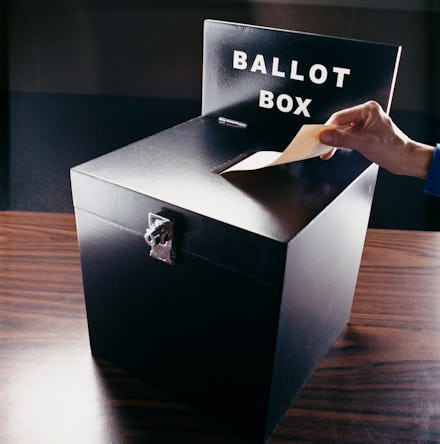One Map Shows How the GOP's War on Voting Could Determine the Elections

As Democrats and Republicans wage the most expensive war in midterm election history, the question of which party ends up controlling the Senate may be determined by a group of people who won't be voting at all.
Thanks to a concerted nationwide effort by conservatives to make it harder to vote, there's a good chance that many of the most competitive races across the country could swing in favor of Republicans by barring poor and minority citizens from the voting booth.
Changing the rules: Voting is much, much, much harder than it was five years ago. The meteoric rise in voter restriction — laws raising the bar for identification that disproportionately prohibit minorities and poor people (who tend to vote Democratic) — is not a curious trend, but a deliberate national campaign that's transforming the electoral landscape. A Brennan Center for Justice report finds that since the 2010 election, new voting restrictions are taking hold in 22 states:
The report's data reveals a partisan and racial cast to the wave of restrictions: Eighteen of the 22 states with new restrictions passed entirely through Republican-controlled legislative bodies, and Mississippi's photo ID law was passed by referendum. Voting restrictions correlate with the proportion of Republicans in a state legislature or whether a Republican inhabits the governor's mansion, according to a study from the University of Massachusetts Boston.
In the 11 states with the highest black turnout in 2008, seven have new restrictions. In the 12 states with the largest Hispanic population growth between 2000 and 2010, nine passed laws making it harder to vote.
How this affects the battle for the Senate: The Nation has an excellent report on the tight Senate races that voter restrictions could play a serious role in shaping. In North Carolina, where black voters are key to the outcome, new restrictions on timing and same-day registration for early voting is very likely to make a dent. Last midterm election, close to one million North Carolinians voted early.
According to the Nation, in Georgia, 40,000 new voter registration applications filed by the New Georgia Project (which has been registering tens of thousands of black, Hispanic and Asian eligible voters in the state this year) are being held up after 25 of their forms turned out to be fraudulent, which the group is required to turn in by law regardless. Huge volumes of rigorous work have revealed that voter fraud is extremely rare and does not pose a serious threat to the electoral process, but it has served as justification for heavy-handed blowback that disenfranchises people at rates that dwarf the rate of fraudulent voting.
New voting restrictions in Kansas in the form of strict voter ID laws and proof of citizenship could pull another tight Senate race away from the Democrats. More than 20,000 voters have had registration status suspended, and the Government Accountability Office estimates their voter ID laws decreased turnout by 2% to 3% in the last election.
Why isn't voting a right? Pursuing power in politics is always going to be ugly, and the expectation that people will always act in good faith in these situations is naive. But even war has rules: International norms prohibit countries from deploying particularly heinous weapons such as poison gases and cluster bombs. Surely making an effort to rig the game and excise entire swathes of the body politic should be considered beyond the pale.
Vox's Matt Yglesias recently discussed the legal problem of how there is technically no constitutional provision stating that all citizens have the right to vote; the Constitution only bars discrimination on the basis of race or gender. A simple solution he suggests is to amend the Constitution to include an affirmative right to vote:
A constitutional right to vote would instantly flip the script on anti-fraud efforts. States would retain a strong interest in developing rules and procedures that make it hard for ineligible voters to vote, but those efforts would be bounded by an ironclad constitutional guarantee that legitimate citizens' votes must be counted. A state that wanted to require possession of a certain ID card to vote, for example, would have to take affirmative steps to ensure that everyone has that ID card, or that there's a process for an ID-less citizen to cast a ballot and have it counted later upon verification of citizenship.
Historically, the capacity to vote has been tied to property, race and gender because it was viewed as an elite act of political participation. Slowly, these requirements have been dismantled in the name of progress. It's time to take another step forward.